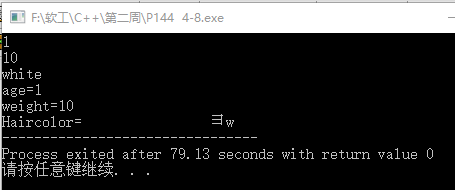/*定义一个Dog类,包含age,weight等属性,以及对这些属性操作的方法
实现并测试这个类*/
#include <iostream>
#include <string.h>
#define N 10
using namespace std;
/* run this program using the console pauser or add your own getch, system("pause") or input loop */
class Dog{
public:
void Age(int a);
void Weight(int b);
void Haircolor(char s[N]);
private:
int x,y;
char c[N];
};
void Dog::Age(int a){
x=a;
cout<<"age="<<x<<endl;
}
void Dog::Weight(int b){
y=b;
cout<<"weight="<<y<<endl;
}
void Dog::Haircolor(char s[N]){
int i=0,n=0;
strcat(c,s);
n=strlen(c);
cout<<"Haircolor=";
while((i++)<n){
cout<<c[i];
}
}
int main(int argc, char** argv) {
Dog mydog; //定义对象mydog
int x=0,y=0;
char c[N];
cin>>x>>y;
cin>>c[N];
mydog.Age(x);
mydog.Weight(y);
mydog.Haircolor(c);
return 0;
}
```
#include <iostream>
#include <string.h>
#define N 10
using namespace std;
/* run this program using the console pauser or add your own getch, system("pause") or input loop */
class Dog{
public:
void Age(int a);
void Weight(int b);
void Haircolor(char s[N]);
private:
int x,y;
char c[N];
};
void Dog::Age(int a){
x=a;
cout<<"age="<<x<<endl;
}
void Dog::Weight(int b){
y=b;
cout<<"weight="<<y<<endl;
}
void Dog::Haircolor(char s[N]){
int i=0,n=0;
c[0] = 0;
strcat(c,s);
n=strlen(c);
cout<<"Haircolor=";
while(i<n){
cout<<(char)c[i++];
}
}
int main(int argc, char** argv) {
Dog mydog; //定义对象mydog
int x=0,y=0;
char c[N];
cin>>x>>y;
cin>>c;
mydog.Age(x);
mydog.Weight(y);
mydog.Haircolor(c);
return 0;
}
你的代码有几个问题:
1. cin>>c[N]; // 字符数组c的长度为10,而这行的意思是给下标为10的位置赋值,出现数组越界,此数组最大下标为9,但是这种情况编译器并不会报错
2. Dog类没有提供构造函数,编译器将会提供简单的默认构造函数,该默认构造函数不会对Dog类的成员进行任何初始化,所以Dog mydog;执行后其非静态变量全部都为随机值,包括x,y,c
3. Haircolor函数只是将参数s的字符串追加到c后面(strcat的作用),而你的代码既没有对dog.c初始化也没有对main函数的c初始化,只是给下标为10的位置赋了个值(前面说了,c没有下标为10的元素),因此在Haircolor里面输出的c为dog.c和传入s连起来的字符串,而两个字符串都为随机值。但是也有可能最后一个字符是你cin输入的字符,因为strcat追加的结束条件是遇到'\0'才会结束